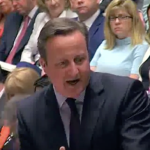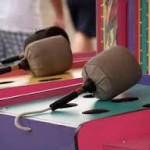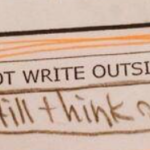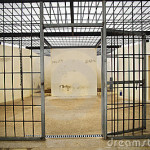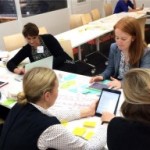At exactly the same time today as UK Prime Minister, David Cameron, was telling the House of Commons that the best option for raising standards was to make all schools government monitored academies, I was sitting with a bunch of educators who were living proof that he’s flat-out wrong.
I go to lots of education conferences, mainly because I’m asked to keynote at them. Truth be told, if I have a day off, the last thing I feel like doing is going to an education conference. But today, I attended a conference as a participant, and I wouldn’t have missed it for the world.
The EOS Alliance held their annual conference today. It was unlike any conference I’d been to. When I keynoted at the inaugural EOS conference, I blogged that it felt like several hundred educators were plugged into the mains, such was the electricity in the room – today was that, on steroids.
For one thing, the space was unlike any other conference space I’ve seen – completely immersive and in keeping with the EOS desire to make classrooms entirely immersive spaces. The whole event had a piracy theme, so it was a happy coincidence (or not) that their opening keynote was conducted by Dave Burgess, of Teach Like A Pirate fame.This was one of the most inspiring and engaging presentations I’ve ever seen. Dave spoke passionately about the maverick, rebellious nature of pirates, and it’s a sad indictment of our school system today that astoundingly great teachers like Dave are dismissed as ‘mavericks’.
Dave brings his experience as a magician to the classroom and the conference venue alike, and that’s because, as he says, teachers should include their own passions in their teaching. His just happens to be magic. I was making furious notes as he spoke, some of which were things like ‘brilliant, charismatic, but how transferrable is this?’ As if he was reading my notes, he then demolished my reservations by arguing that: a) he worked bloody hard, failing often, to be this charismatic; b) the myth of the blinding flash of light means that some teachers excuse themselves, from the kind of magic Dave was creating, by saying “I’m not creative”. His dismissal of this was to say that we won’t see creative ideas for teaching – and therefore get over our creative phobia – unless we think it’s important. Another brilliant analogy he used was to liken teaching to a great barbecue. Content = the meat, but the magic happens in the use of heat, the marinade, the accompaniments. Too many teachers throw the raw meat (content) at students and say ‘Eat it’.
That was the opening – the closing presentation was provided by Mark Stevenson who brilliantly showed how the future is going to be so radically different to what we’ve experienced so far (pilotless planes, abundant cheap energy, home 3D printing of medicines, reverse desertification, for starters) that to think we can continue to teach kids the way we’ve always done is farcical. The urgency of the breakdown of most of our infrastructures – capitalism, party politics, fossil fuel production, economic, social and food distribution – require tomorrow’s citizens/today’s students to display creativity and problem-solving on an unprecedented scale. And we’re arguing about the best way to teach times tables?
Between those two keynotes were a range of workshops where teachers were sharing their classroom innovations in a genuine spirit of openness, reciprocity and mutual. benefit. No-one mentioned league tables, standardised testing or literacy and numeracy levels, because they all understood there was a much bigger game in play. As Dave Burgess said, teachers real effectiveness can only be measured through generations, not test scores. Government – and some academy chains I’ve worked with – only measure teachers effectiveness by the most recent set of exam results. How can that possibly be in the best long-term interests of our students?
And yet, that’s precisely what our Prime Minister was dictating was going to happen, while 400 committed educators, with vast aggregated experience, were metaphorically ‘walking the plank’.
The strap-line of the EOS conference was ‘There’s a storm coming’. Well, actually, there are two: the first is the triumph of the neoliberal agenda in education, so that all schools are forced to compete, in a free-marketplace, tested against a set of standards that bear no relation to the other approaching storm. That one says that we’re in a global scenario where, in the words of Mark Stevenson, ‘all bets are off’, and we’d better place a premium on finding solutions collaboratively, not competitively, so that we grow the innovators of the future.
The sheer arrogance of this government, dismissing the assembled expertise of educators, academics and local authority experts – who’ve spent their whole lives grappling with these problems – as the irrelevant squealing of ‘the blob’, is gob-smacking. Our Prime Minister decreed today that, structurally, there’s a one-size-fits-all solution that’s going to be handed down by government – so you’d better ‘eat it’.
Well, I’m sorry, but it doesn’t have to be that way. The EOS Alliance, and their counterparts, prove that schools can voluntarily come together, to find ways of preparing our kids for a radically altered future. Can learn from each other cheaply, socially, with a sense of fun and mutual respect. Can undertake peer review of each other’s practices, so that teaching and learning is transformed. Can welcome complexity, and divergent thinking, so that the best interests of their students can be served. Can see that the prime focus of education isn’t to drill experts in test-taking, but to build citizens who want to make the world a better place.
Being a pirate is a risky business, compared to carrying out the orders of bean-counters, but it’s not only way more fun, it’s essential to our student’s futures. If you wanted evidence of the compelling nature of the counter-movement, bubbling away under the gaze of the government, it’s this: 75% of tickets for next years EOS conference were sold by the end of this years. Get a ticket quick – join the mutiny!

